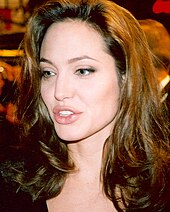Angelina Jolie theme by GunsOfLiberty
Download: AngelinaJolie.p3t

(7 backgrounds)
Angelina Jolie | |
|---|---|
 Jolie in 2022 | |
| Born | Angelina Jolie Voight June 4, 1975 Los Angeles, California, U.S. |
| Other names | Angelina Jolie Pitt[1] |
| Citizenship |
|
| Occupations |
|
| Years active | 1982–present |
| Works | Full list |
| Spouses | |
| Children | 6 |
| Parents |
|
| Relatives |
|
| Awards | Full list |
| Special Envoy to the United Nations High Commissioner for Refugees | |
| In office April 17, 2012 – December 17, 2022 | |
| High Commissioner | António Guterres (2012–2015) Filippo Grandi (2016–2022) |
| Preceded by | Office established |
Angelina Jolie[3] (/dʒoʊˈliː/; born Angelina Jolie Voight;[4] June 4, 1975) is an American actress, filmmaker, and humanitarian. The recipient of numerous accolades, including an Academy Award, a Tony Award and three Golden Globe Awards, she has been named Hollywood's highest-paid actress multiple times.
Jolie made her screen debut as a child alongside her father, Jon Voight, in Lookin' to Get Out (1982). Her film career began in earnest a decade later with the low-budget production Cyborg 2 (1993), followed by her first leading role in Hackers (1995). After starring in the biographical television films George Wallace (1997) and Gia (1998), Jolie won the Academy Award for Best Supporting Actress for playing a sociopath in the 1999 drama Girl, Interrupted. Her portrayal of the titular heroine in Lara Croft: Tomb Raider (2001) established her as a household name. Her fame continued with roles in the action films Mr. & Mrs. Smith (2005), Wanted (2008), and Salt (2010). She also received acclaim for her performances in the dramas A Mighty Heart (2007) and Changeling (2008), the latter earning her a nomination for the Academy Award for Best Actress. Her other commercial successes include the fantasy film Maleficent (2014), its 2019 sequel, and the superhero film Eternals (2021). She played a voice role in the Kung Fu Panda animated film series from 2008 to 2016. Jolie has directed and written the war dramas In the Land of Blood and Honey (2011), Unbroken (2014), and First They Killed My Father (2017).
Jolie is known for her humanitarian efforts. The causes she promotes include conservation, education, and women's rights. She has been noted for her advocacy on behalf of refugees as a Special Envoy for the United Nations High Commissioner for Refugees. She has undertaken various field missions to refugee camps and war zones worldwide. In addition to receiving a Jean Hersholt Humanitarian Award among other honors, Jolie was made an honorary Dame Commander of the Order of St Michael and St George.
As a public figure, Jolie has been cited as one of the most powerful and influential people in the American entertainment industry. She has been cited as the world's most beautiful woman by various publications. Her personal life, including her relationships and health, has been the subject of widespread attention. Jolie is divorced from actors Jonny Lee Miller, Billy Bob Thornton, and Brad Pitt. She has six children with Pitt.
Early life and education[edit]

Angelina Jolie Voight was born on June 4, 1975, at Cedars-Sinai Hospital in Los Angeles, California, to actors Jon Voight and Marcheline Bertrand.[5][4][6] She is the sister of actor James Haven, and the niece of singer-songwriter Chip Taylor[7] and geologist and volcanologist Barry Voight.[8] Her godparents are actors Jacqueline Bisset and Maximilian Schell.[9] On her father's side, Jolie is of German and Slovak descent.[10] Jolie has claimed to have distant Indigenous (Iroquois) ancestry through her French-Canadian mother. However, her father says Jolie is "not seriously Iroquois", saying it is something he and Bertrand made up to make Bertrand seem more "exotic".[11]
Following her parents' separation in 1976, she and her brother lived with their mother, who had abandoned her acting ambitions to focus on raising her children.[12] Jolie's mother raised her as a Catholic but did not require her to go to church.[13] As a child, she often watched films with her mother and it was this, rather than her father's successful career, that inspired her interest in acting,[14] though she had a bit part in Voight's Lookin' to Get Out (1982) at age seven.[15] When Jolie was six years old, Bertrand and her live-in partner, filmmaker Bill Day, moved the family to Palisades, New York;[16] they returned to Los Angeles five years later.[12] Jolie then decided she wanted to act and enrolled at the Lee Strasberg Theatre Institute, where she trained for two years and appeared in several stage productions.
Jolie first attended Beverly Hills High School, where she felt isolated among the children of some of the area's affluent families because her mother had a more modest income. She was teased by other students, who targeted her for being extremely thin and for wearing glasses and braces.[14] Her early attempts at modeling, at her mother's insistence, proved unsuccessful.[17][18] She transferred to Moreno High School, an alternative school, where she became a "punk outsider",[17] wearing all-black clothing, going out moshing, and engaging in knife play with her live-in boyfriend.[14] She dropped out of her acting classes and aspired to become a funeral director,[15] taking at-home courses on embalming.[19] At age 16, after the relationship had ended, Jolie graduated from high school and rented her own apartment before returning to theater studies,[12][17] though in 2004 she referred to this period with the observation, "I am still at heart—and always will be—just a punk kid with tattoos."[20]
As a teenager, Jolie found it difficult to emotionally connect with other people, and as a result she self-harmed,[21] later commenting, "For some reason, the ritual of having cut myself and feeling the pain, maybe feeling alive, feeling some kind of release, it was somehow therapeutic to me."[22] She also struggled with insomnia and an eating disorder[19] and began using drugs; by age 20, she had used "just about every drug possible," particularly heroin.[23] Jolie had episodes of depression and planned to commit suicide twice—at age 19 and again at 22, when she attempted to hire a hitman to kill her.[15] When she was 24, she experienced a nervous breakdown and was admitted for 72 hours to UCLA Medical Center's psychiatric ward.[15] Two years later, after adopting her first child, Jolie found stability, later stating, "I knew once I committed to Maddox, I would never be self-destructive again."[24]
Jolie has had a lifelong dysfunctional relationship with her father, which started when Voight left the family when she was less than a year old.[25] She has said that from then on their time together was sporadic and usually carried out in front of the press.[26] They reconciled when they appeared together in Lara Croft: Tomb Raider (2001), but their relationship again deteriorated.[12] Jolie petitioned the court to legally remove her surname, Voight, in favor of her middle name, which she had long used as a stage name; the name change was granted on September 12, 2002.[27] Voight then went public with their estrangement during an appearance on Access Hollywood, in which he claimed Jolie had "serious mental problems."[28] At that point, her mother and brother also broke off contact with him.[29] They did not speak for six and a half years,[30] later rebuilding their relationship in the wake of Bertrand's death from ovarian cancer on January 27, 2007,[29][31] before going public with their reconciliation three years later.[29]
Career[edit]
Early work (1991–1997)[edit]
Jolie committed to acting professionally at the age of 16, but initially found it difficult to pass auditions, often being told that her demeanor was "too dark."[15] She appeared in five of her brother's student films, made while he attended the USC School of Cinema-Television, as well as in several music videos, such as those for Lenny Kravitz's "Stand by My Woman" (1991), Antonello Venditti's "Alta Marea" (1991), The Lemonheads's "It's About Time" (1993), and Meat Loaf's "Rock and Roll Dreams Come Through" (1993). In 1993, she appeared on the cover of the Widespread Panic album Everyday.[32] Jolie then learned from her father by noticing his method of observing people to become like them. Their relationship was less strained during this time, with Jolie realizing that they were both "drama queens".[14]
Jolie started her professional film career in 1993, when she played her first leading role in the direct-to-video science-fiction sequel Cyborg 2, as a near-human robot designed for corporate espionage and assassination. She was so disappointed with the film that she did not audition again for a year.[15] Following a supporting role in the independent film Without Evidence (1995), she starred in her first major studio film, Hackers (1995). The New York Times critic Janet Maslin wrote that Jolie's character "stands out ... because she scowls even more sourly than [her co-stars] and is that rare female hacker who sits intently at her keyboard in a see-through top."[33] Hackers failed to make a profit at the box office, but developed a cult following after its video release.[34] The role in Hackers is considered Jolie's breakthrough.[35][36][37]
After starring in the modern-day Romeo and Juliet adaptation Love Is All There Is (1996), Jolie appeared in the road movie Mojave Moon (1996). In Foxfire (1996) she played Legs, a drifter who unites four teenage girls against a teacher who has sexually harassed them. Jack Mathews of the Los Angeles Times wrote of her performance, "It took a lot of hogwash to develop this character, but Jolie, Jon Voight's knockout daughter, has the presence to overcome the stereotype. Though the story is narrated by Maddy, Legs is the subject and the catalyst."[38]
In 1997, Jolie starred with David Duchovny in the thriller Playing God, set in the Los Angeles underworld. The film was not well received by critics; Chicago Sun-Times critic Roger Ebert wrote that Jolie "finds a certain warmth in a kind of role that is usually hard and aggressive; she seems too nice to be [a mobster's] girlfriend, and maybe she is."[39] Her next work, as a frontierswoman in the CBS miniseries True Women (1997), was even less successful; writing for The Philadelphia Inquirer, Robert Strauss dismissed her as "horrid, a fourth-rate Scarlett O'Hara" who relies on "gnashed teeth and overly pouted lips."[40] Jolie also starred in the music video for the Rolling Stones's "Anybody Seen My Baby?" as a stripper who leaves mid-performance to wander New York City.[41]
Rise to prominence (1998–2000)[edit]
Jolie's career prospects improved after she won a Golden Globe Award for her performance in TNT's George Wallace (1997), a film about segregationist Alabama Governor and presidential candidate George Wallace, played by Gary Sinise. Jolie portrayed Wallace's second wife, Cornelia Wallace, a performance Lee Winfrey of The Philadelphia Inquirer considered a highlight of the film.[42] George Wallace was well received by critics, and Jolie received a nomination for a Primetime Emmy Award for Outstanding Supporting Actress in a Miniseries or a Movie for her performance.[43]
Jolie portrayed supermodel Gia Carangi in HBO's Gia (1998). The television film chronicles the destruction of Carangi's life and career as a result of her addiction to heroin, and her decline and death from AIDS in the mid-1980s. Vanessa Vance of Reel.com retrospectively noted, "Jolie gained wide recognition for her role as the titular Gia, and it's easy to see why. Jolie is fierce in her portrayal—filling the part with nerve, charm, and desperation—and her role in this film is quite possibly the most beautiful train wreck ever filmed."[44] For the second consecutive year, Jolie won a Golden Globe Award and received an Emmy Award nomination. She also won her first Screen Actors Guild Award.[45]
In accordance with Lee Strasberg's method acting, Jolie preferred to stay in character in between scenes during many of her early films. While shooting Gia, she told her husband, Jonny Lee Miller, that she would not be able to phone him: "I'd tell him: 'I'm alone; I'm dying; I'm gay; I'm not going to see you for weeks.'"[46] After Gia wrapped, she briefly gave up acting, because she felt that she had "nothing else to give."[15] She separated from Miller and moved to New York, where she took night classes at New York University to study directing and screenwriting.[12] Encouraged by her Golden Globe Award win for George Wallace and the positive critical reception of Gia, Jolie resumed her career.[15]
Following the previously filmed gangster film Hell's Kitchen (1998), Jolie returned to the screen in Playing by Heart (1998), part of an ensemble cast that included Sean Connery, Gillian Anderson, and Ryan Phillippe. The film received predominantly positive reviews, and Jolie was praised in particular; San Francisco Chronicle critic Peter Stack wrote, "Jolie, working through an overwritten part, is a sensation as the desperate club crawler learning truths about what she's willing to gamble."[47] She won the Breakthrough Performance Award from the National Board of Review.[48]
In 1999, Jolie starred in the comedy-drama Pushing Tin, alongside John Cusack, Billy Bob Thornton, and Cate Blanchett. The film met with mixed reception from critics, and Jolie's character—Thornton's seductive wife—was particularly criticized; writing for The Washington Post, Desson Howe dismissed her as "a completely ludicrous writer's creation of a free-spirited woman who weeps over hibiscus plants that die, wears lots of turquoise rings and gets real lonely when Russell spends entire nights away from home."[49] Jolie then co-starred with Denzel Washington in The Bone Collector (1999), playing a police officer who reluctantly helps Washington's quadriplegic detective track down a serial killer. The film grossed $151.5 million worldwide,[50] but was critically unsuccessful. Terry Lawson of the Detroit Free Press concluded, "Jolie, while always delicious to look at, is simply and woefully miscast."[51]
"Jolie is emerging as one of the great wild spirits of current movies, a loose cannon who somehow has deadly aim."
—Chicago Sun-Times critic Roger Ebert on Jolie's performance in Girl, Interrupted (1999)[52]
Jolie next took the supporting role of Lisa, a sociopathic patient in a psychiatric hospital, in Girl, Interrupted (1999), an adaptation of Susanna Kaysen's 1993 memoir. For Variety, Emanuel Levy deemed her "excellent as the flamboyant, irresponsible girl who turns out to be far more instrumental than the doctors in Susanna's rehabilitation."[53] Jolie won the Golden Globe Award for Best Supporting Actress – Motion Picture, the Screen Actors Guild Award for Outstanding Performance by a Female Actor in a Supporting Role and the Academy Award for Best Supporting Actress for her performance in the film.
In 2000, Jolie appeared in her first summer blockbuster, Gone in 60 Seconds, which became her highest-grossing film to that point, earning $237.2 million internationally.[50] She had a minor role as the mechanic ex-girlfriend of a car thief played by Nicolas Cage; The Washington Post writer Stephen Hunter criticized that "all she does in this movie is stand around, cooling down, modeling those fleshy, pulsating muscle-tubes that nest so provocatively around her teeth."[54] Jolie later explained that the film had been a welcome relief after her emotionally demanding role in Girl, Interrupted.
Worldwide recognition (2001–2004)[edit]
Although widely praised for her acting and performances, Jolie had rarely found films that appealed to a wide audience, but 2001's Lara Croft: Tomb Raider made her an international superstar. An adaptation of the popular Tomb Raider video games, the film required her to learn an English accent and undergo extensive martial arts training to play the archaeologist-adventurer Lara Croft. Although the film generated mostly negative reviews, Jolie was generally praised for her physical performance; Newsday's John Anderson commented, "Jolie makes the title character a virtual icon of female competence and coolth."[55] The film was an international hit, earning $274.7 million worldwide,[50] and launched her global reputation as a female action star.
Jolie next starred opposite Antonio Banderas as his mail-order bride in Original Sin (2001), the first of a string of films that were poorly received by critics and audiences alike. The New York Times critic Elvis Mitchell questioned Jolie's decision to follow her Oscar-winning performance with "soft-core nonsense."[56] The romantic comedy Life or Something Like It (2002), though equally unsuccessful, marked an unusual choice for Jolie. Salon magazine's Allen Barra considered her ambitious newscaster character a rare attempt at playing a conventional women's role, noting that her performance "doesn't get off the ground until a scene where she goes punk and leads a group of striking bus workers in singing 'Satisfaction'".[57] Despite her lack of box office success, Jolie remained in demand as an actress;[20] in 2002, she established herself among Hollywood's highest-paid actresses, earning $10–15 million per film for the next five years.[58]

Jolie reprised her role as Lara Croft in Lara Croft: Tomb Raider – The Cradle of Life (2003), which was not as lucrative as the original, earning $156.5 million at the international box office.[50] She also starred in the music video for Korn's "Did My Time", which was used to promote the sequel. Her next film was Beyond Borders (2003), in which she portrayed a socialite who joins an aid worker played by Clive Owen. Though unsuccessful with audiences, the film stands as the first of several passion projects Jolie has made to bring attention to humanitarian causes.[59] Beyond Borders was a critical failure; Kenneth Turan of the Los Angeles Times acknowledged Jolie's ability to "bring electricity and believability to roles," but wrote that "the limbo of a hybrid character, a badly written cardboard person in a fly-infested, blood-and-guts world, completely defeats her."[60]
In 2004, Jolie appeared in four films. She first starred in the thriller Taking Lives as an FBI prof
